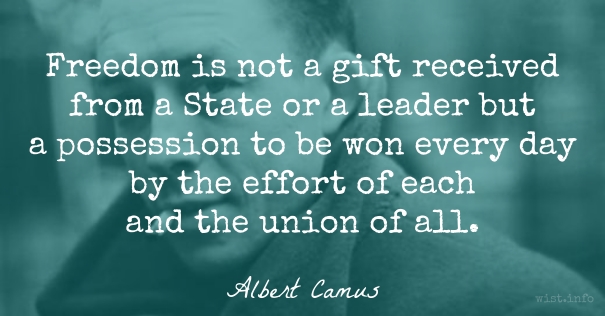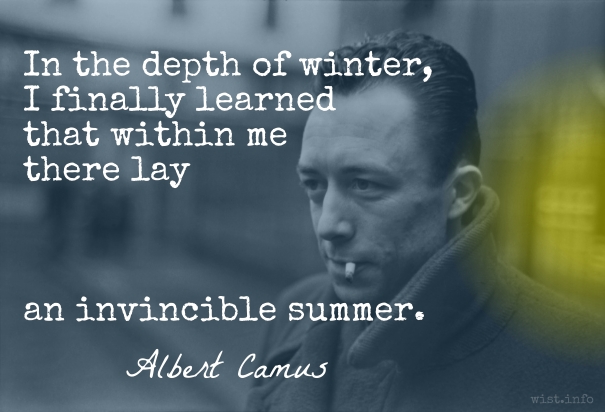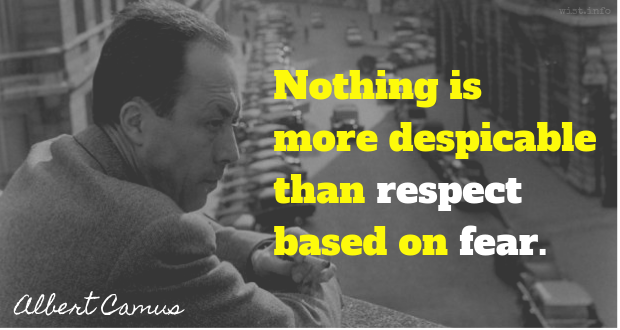Quotations by:
Camus, Albert
The welfare of the people in particular has always been the alibi of tyrants, and it provides the further advantage of giving the servants of tyranny a good conscience. It would be easy, however, to destroy that good conscience by shouting to them: if you want the happiness of the people, let them speak out and tell what kind of happiness they want and what kind they don’t want! But, in truth, the very ones who make use of such alibis know they are lies; they leave to their intellectuals on duty the chore of believing in them and of proving that religion, patriotism, and justice need for their survival the sacrifice of freedom.
Albert Camus (1913-1960) Algerian-French novelist, essayist, playwright
“Homage to an Exile” (1955)
Published as an essay in Actuelles III, originally a speech (7 Dec 1955) at a banquet in honor of President Eduardo Santos, editor of El Tiempo, driven out of Columbia by a dictatorship". Reprinted in Resistance, Rebellion, and Death (1960).
Capital punishment is the most premeditated of murders, to which no criminal’s deed, however calculated, can be compared. For there to be an equivalency, the death penalty would have to punish a criminal who had warned his victim of the date on which he would inflict a horrible death on him and who, from that moment onward, had confined him at his mercy for months. Such a monster is not to be encountered in private life.
The gods had condemned Sisyphus to ceaselessly rolling a rock to the top of a mountain, whence the stone would fall back of its own weight. They had thought with some reason that there is no more dreadful punishment than futile and hopeless labor.
Albert Camus (1913-1960) Algerian-French novelist, essayist, playwright
“The Myth of Sisyphus”, The Myth of Sisyphus (1942)
(Source)
Don’t let them tell us stories. Don’t let them say of the man sentenced to death “He is going to pay his debt to society,” but: “They are going to cut off his head.” It looks like nothing. But it does make a little difference.
No matter what cause one defends, it will suffer permanent disgrace if one resorts to blind attacks on crowds of innocent people in which the killer knows in advance that he will kill women and children.
Albert Camus (1913-1960) Algerian-French novelist, essayist, playwright
Algerian Chronicles [Chroniques Algérienne], Preface (1948) [tr. Goldhammer (2013)]
(Source)
Criticizing the Front de Libération Nationalale (FLN), the movement for Algerian independence (after similarly criticizing the French government for its violent activity).
Beauty is unbearable, drives us to despair, offering us for a minute the glimpse of an eternity that we should like to stretch out over the whole of time.
Albert Camus (1913-1960) Algerian-French novelist, essayist, playwright
Notebooks: 1935-1942 Notebook 1, May 1935 [tr. Thody (1963)
(Source)
Always struck by the “comical” aspect of everything in Algeria connected with death. I find nothing more justified. Impossible to exaggerate the ridiculous quality of an event that is normally accompanied by sweat and gurgling. Similarly, it could not be too far demoted from the sacred status normally attributed to it. Nothing is more despicable than respect based on fear. And from this point of view, death is no more worthy of respect than Nero or the inspector at my local police station.
Albert Camus (1913-1960) Algerian-French novelist, essayist, playwright
Notebooks: 1935-1942, Notebook 3, Nov 1939 [tr. Thody (1963)]
(Source)
Illness is a convent which has its rule, its austerity, its silences, and its inspirations.
Albert Camus (1913-1960) Algerian-French novelist, essayist, playwright
Notebooks: 1942-1951, Notebook 4, Jan 1942 – Sep 1945 [tr. O’Brien/Thody (1963)
(Source)
Poor and free rather than rich and enslaved. Of course, men want to be both rich and free, and this is what leads them at times to be poor and enslaved.
[Pauvre et libre plutôt que riche et asservi. Bien entendu les hommes veulent être et riches et libres et c’est ce qui les conduit quelquefois à être pauvres et esclaves.]
Albert Camus (1913-1960) Algerian-French novelist, essayist, playwright
Notebooks: 1942-1951, Notebook 4, Jan 1942 – Sep 1945 [tr. O’Brien/Thody (1963)
(Source)
Nobody realizes that some people expend tremendous energy merely to be normal.
Albert Camus (1913-1960) Algerian-French novelist, essayist, playwright
Notebooks: 1942-1951, Notebook 4, Jan 1942 – Sep 1945 [tr. O’Brien/Thody (1963)
(Source)
Cited as "B.B."
A free press can of course be good or bad, but, most certainly, without freedom it will never be anything but bad. … Freedom means nothing but a chance to be better, whereas enslavement is a certainty of the worse.
Alas, after a certain age, every man is responsible for his face.
[Hélas! après un certain âge tout homme est responsable do son visage.]
Sometimes, carrying on, just carrying on, is the superhuman achievement.
Albert Camus (1913-1960) Algerian-French novelist, essayist, playwright
The Fall [La Chute] (1956)
(Source)
How many crimes committed merely because their authors could not endure being wrong?
Albert Camus (1913-1960) Algerian-French novelist, essayist, playwright
The Fall [La Chute] (1956) [tr. O’Brien]
(Source)
Something must happen — and that explains most human commitments. Something must happen, even loveless slavery, even war or death.
Albert Camus (1913-1960) Algerian-French novelist, essayist, playwright
The Fall [La Chute] (1956) [tr. O’Brien]
(Source)
I never complained that my birthday was overlooked; people were even surprised, with a touch of admiration, by my discretion on this subject. But the reason for my disinterestedness was even more discrete: I longed to be forgotten in order to be able to complain to myself.
A man wants to earn money in order to be happy, and his whole effort and the best of a life are devoted to the earning of that money. Happiness is forgotten; the means are taken for the end.
Albert Camus (1913-1960) Algerian-French novelist, essayist, playwright
The Myth of Sisyphus, “Absurd Creation” (1942) [tr. O’Brien (1991)]
(Source)
When a war breaks out, people say: “It’s too stupid; it can’t last long.” But though the war may well be “too stupid,” that doesn’t prevent its lasting. Stupidity has a knack of getting its way; as we should see if we were not always so much wrapped up in ourselves.
The evil that is in the world always comes of ignorance, and good intentions may do as much harm as malevolence, if they lack understanding. On the whole men are more good than bad; that, however, isn’t the real point. But they are more or less ignorant, and it is this that we call vice or virtue; the most incorrigible vice being that of an ignorance which fancies it knows everything and therefore claims for itself the right to kill. There can be no true goodness, nor true love, without the utmost clear-sightedness.
A novel is never anything but a philosophy put into images. And in a good novel, the whole of the philosophy has passed into the images. But if once the philosophy overflows the characters and action, and therefore looks like a label stuck on the work, the plot loses its authenticity and the novel its life. Nevertheless, a work that is to last cannot dispense with profound ideas. And this secret fusion between experiences and ideas, between life and reflection on the meaning of life, is what makes the great novelist.
What the world expects of Christians is that Christians should speak out, loud and clear, and that they should voice their condemnation in such a way that never a doubt, never the slightest doubt, could rise in the heart of the simplest man. […] Perhaps we cannot prevent this world from being a world in which children are tortured. But we can reduce the number of tortured children. And if you don’t help us, who else in the world can help us do this?




